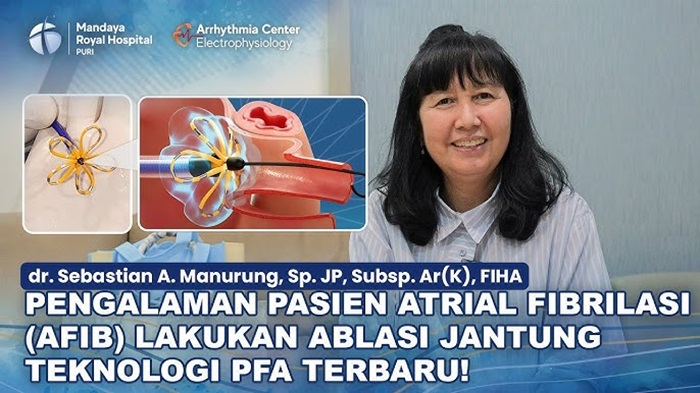Mandaya Puri Hospital successfully performed its second Pulsed Field Ablation (PFA) procedure on a patient diagnosed with atrial fibrillation (AFib). The patient’s case was particularly tricky as it presented without symptoms. However, if left untreated, AFib can lead to complications such as stroke. The outcome of the PFA heart ablation was highly satisfactory, and the patient’s recovery was quick.
Contents
Testimony of an Atrial Fibrillation Patient Undergoing PFA at Mandaya Hospital
A female patient from Solo visited Mandaya Royal Puri Hospital with atrial fibrillation (AFib). She had experienced irregular heart rhythms (arrhythmia) for the past three years, yet had no complaints—she didn’t even feel tired when walking.
However, after undergoing a treadmill test and electrocardiogram (ECG), doctors discovered her heart rhythm was inconsistent—sometimes low, sometimes high. This made her feel anxious about exercising. She feared that physical activity, like a morning walk, would cause her heart rhythm to spike or drop suddenly.
A few months ago, she consulted a doctor who informed her that she needed to undergo an ablation. If left untreated, her irregular heart rhythm could become permanent and increase her risk of stroke.
Initially, the patient was afraid, as traditional ablation procedures can take up to five hours. She even considered canceling the operation. However, upon arriving at Mandaya Royal Puri Hospital, she learned about the PFA heart ablation method, which has a much shorter procedure time. This gave her the confidence to proceed with the surgery.
The results were very positive. Her recovery was rapid—she was discharged just one day after the procedure and did not experience any significant side effects. Now, she is no longer afraid to exercise because the PFA ablation successfully restored her heart rhythm to normal.
Explanation by Dr. Sebastian on Intermittent Atrial Fibrillation
Atrial fibrillation (AFib) is an irregular and often rapid heart rhythm. This condition can lead to blood clots in the heart, increasing the risk of stroke, heart failure, and other heart-related complications.
Common symptoms include:
- Rapid and pounding heartbeat (palpitations)
- Chest pain
- Dizziness
- Fatigue
- Decreased ability to exercise
- Shortness of breath
- Weakness
Sometimes, patients may not experience any symptoms at all.
The PFA heart ablation at Mandaya Royal Puri Hospital was performed by cardiologist and electrophysiology consultant Dr. Sebastian Andy Manurung, Sp.JP, Subsp.Ar(K), FIHA.
According to Dr. Sebastian, this particular case was tricky and confusing since the patient experienced no symptoms and her irregular heart rhythm was intermittent. If left untreated, the irregular rhythm could become permanent.
“We discovered the atrial fibrillation through a 24-hour Holter monitor,” said Dr. Sebastian. “This condition needs to be addressed promptly. Intermittent irregular heart rhythms can eventually become constant and permanent. Performing PFA ablation helps prevent the risk of stroke,” he added.
Advantages of PFA Heart Ablation
Unlike conventional heart ablation, which uses heat energy, PFA heart ablation uses electrical energy to treat the heart’s electrical system.
During the procedure, doctors use a multipoint/multipolar catheter to treat multiple areas of the heart simultaneously, significantly reducing procedure time.
According to Dr. Sebastian, the advantages of PFA heart ablation include:
- Much shorter procedure time (about 1–2 hours compared to 3–4 hours with conventional ablation)
- Greater patient comfort
- Faster recovery time
Additionally, PFA ablation carries a lower risk of complications, is safer for the tissues surrounding the heart, and provides long-term effectiveness.
Profile of Dr. Sebastian, Heart Rhythm Specialist


Dr. Sebastian is a cardiologist and electrophysiology consultant with expertise in treating irregular heart rhythms. In addition to PFA ablation, he also performs 3D cardiac ablation, known as radiofrequency ablation.
He studied medicine at the Faculty of Medicine, Universitas Padjadjaran, and completed his specialization in cardiology at the Faculty of Medicine, University of Indonesia/National Cardiac Center Harapan Kita. He received his arrhythmia consultant training at the National Cardiac Center Harapan Kita/Indonesian College of Cardiology.
Beyond ablation, Dr. Sebastian is also skilled in pacemaker implantation, including the world’s smallest pacemaker—Micra—which he successfully implanted in a patient at Mandaya Royal Puri Hospital.
Dr. Sebastian is available at Mandaya Royal Puri Hospital during the following hours:
- Tuesday: 4:00 PM – 8:00 PM WIB
- Thursday: 4:00 PM – 8:00 PM WIB
If you wish to consult about arrhythmia, atrial fibrillation, or procedures such as heart ablation with Dr. Sebastian, feel free to visit Mandaya Royal Puri Hospital.
To simplify your visit, you can use the Chat feature via WhatsApp, Book Appointment, or the Care Dokter app available on Google Play and the App Store. These tools can help you manage appointments, check queue numbers, and access complete information.



